现在完成时和一般过去时的区别
小学六年重要知识点现在完成时与一般过去时的区别

小学六年重要知识点现在完成时与一般过去时的区别在小学六年级的英语学习中,现在完成时和一般过去时是两个重要的时态。
虽然它们都表示过去的动作或状态,但是在用法和含义上存在一些区别。
下面将详细介绍现在完成时和一般过去时的区别。
一、现在完成时的用法现在完成时表示过去发生的动作或已完成的状态与现在的关系。
它通常与包括"have"或"has"的助动词连用,并且当前仍有相关的影响或结果。
1. 表示过去发生的动作或已完成的状态对现在造成的影响或结果:- I have finished my homework.(我已经完成了我的作业。
)(现在,我没有作业要做了。
)- She has lost her key.(她已经丢失了她的钥匙。
)(现在,她无法打开门。
)2. 表示过去开始的动作一直延续到现在(或现在仍在进行):- They have lived in this city for three years.(他们在这个城市已经住了三年了。
)(他们仍然住在这个城市。
)二、一般过去时的用法一般过去时表示过去发生的动作或状态,与现在没有直接关系,对现在没有影响或结果。
1. 表示过去发生的动作或状态:- I finished my homework yesterday.(我昨天完成了我的作业。
)- She lost her key last week.(她上周丢失了她的钥匙。
)2. 表示过去的习惯或经常性动作:- They always played soccer after school.(他们放学后总是踢足球。
)三、现在完成时与一般过去时的区别1. 时间表达上的差异:- 现在完成时通常使用含有"have"或"has"的助动词,并结合表示过去的时间状语,如"just", "already", "yet"等。
一般过去时和现在完成时的区别
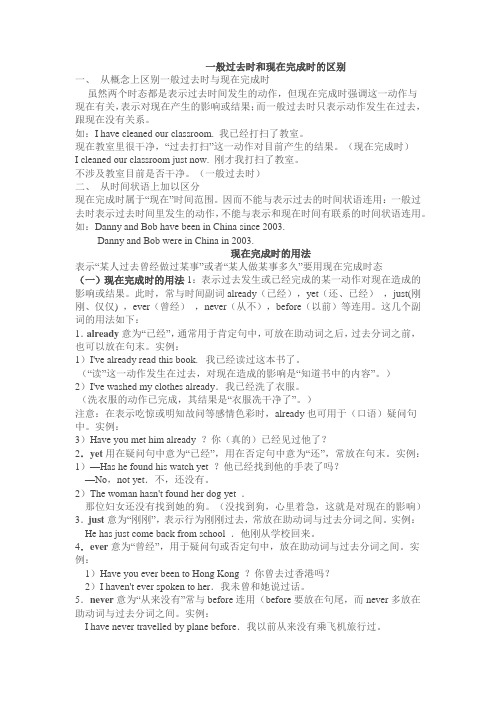
一般过去时和现在完成时的区别一、从概念上区别一般过去时与现在完成时虽然两个时态都是表示过去时间发生的动作,但现在完成时强调这一动作与现在有关,表示对现在产生的影响或结果;而一般过去时只表示动作发生在过去,跟现在没有关系。
如:I have cleaned our classroom. 我已经打扫了教室。
现在教室里很干净,“过去打扫”这一动作对目前产生的结果。
(现在完成时)I cleaned our classroom just now. 刚才我打扫了教室。
不涉及教室目前是否干净。
(一般过去时)二、从时间状语上加以区分现在完成时属于“现在”时间范围。
因而不能与表示过去的时间状语连用:一般过去时表示过去时间里发生的动作,不能与表示和现在时间有联系的时间状语连用。
如:Danny and Bob have been in China since 2003.Danny and Bob were in China in 2003.现在完成时的用法表示“某人过去曾经做过某事”或者“某人做某事多久”要用现在完成时态(一)现在完成时的用法1:表示过去发生或已经完成的某一动作对现在造成的影响或结果。
此时,常与时间副词already(已经),yet(还、已经),just(刚刚、仅仅) ,ever(曾经),never(从不),before(以前)等连用。
这几个副词的用法如下:1.already意为“已经”,通常用于肯定句中,可放在助动词之后,过去分词之前,也可以放在句末。
实例:1)I've already read this book. 我已经读过这本书了。
(“读”这一动作发生在过去,对现在造成的影响是“知道书中的内容”。
)2)I've washed my clothes already.我已经洗了衣服。
(洗衣服的动作已完成,其结果是“衣服冼干净了”。
)注意:在表示吃惊或明知故问等感情色彩时,already也可用于(口语)疑问句中。
现在完成时与一般过去时的区别
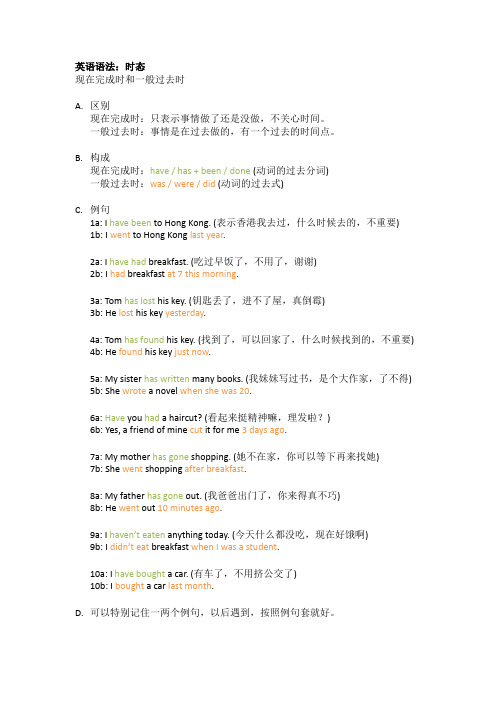
英语语法:时态现在完成时和一般过去时A.区别现在完成时:只表示事情做了还是没做,不关心时间。
一般过去时:事情是在过去做的,有一个过去的时间点。
B.构成现在完成时:have / has + been / done (动词的过去分词)一般过去时:was / were / did (动词的过去式)C.例句1a: I have been to Hong Kong. (表示香港我去过,什么时候去的,不重要) 1b: I went to Hong Kong last year.2a: I have had breakfast. (吃过早饭了,不用了,谢谢)2b: I had breakfast at 7 this morning.3a: Tom has lost his key. (钥匙丢了,进不了屋,真倒霉)3b: He lost his key yesterday.4a: Tom has found his key. (找到了,可以回家了,什么时候找到的,不重要) 4b: He found his key just now.5a: My sister has written many books. (我妹妹写过书,是个大作家,了不得) 5b: She wrote a novel when she was 20.6a: Have you had a haircut? (看起来挺精神嘛,理发啦?)6b: Yes, a friend of mine cut it for me 3 days ago.7a: My mother has gone shopping. (她不在家,你可以等下再来找她)7b: She went shopping after breakfast.8a: My father has gone out. (我爸爸出门了,你来得真不巧)8b: He went out 10 minutes ago.9a: I haven’t eaten anything today. (今天什么都没吃,现在好饿啊)9b: I didn’t eat breakfast when I was a student.10a: I have bought a car. (有车了,不用挤公交了)10b: I bought a car last month.D.可以特别记住一两个例句,以后遇到,按照例句套就好。
现在完成时和一般过去时的比较
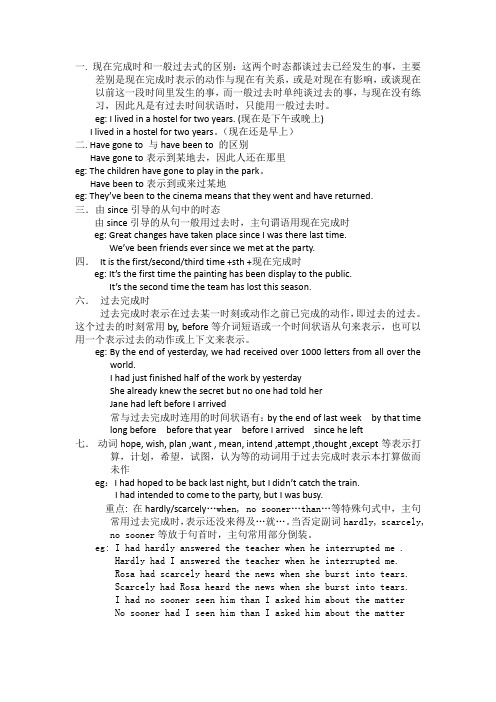
一. 现在完成时和一般过去式的区别:这两个时态都谈过去已经发生的事,主要差别是现在完成时表示的动作与现在有关系,或是对现在有影响,或谈现在以前这一段时间里发生的事,而一般过去时单纯谈过去的事,与现在没有练习,因此凡是有过去时间状语时,只能用一般过去时。
eg: I lived in a hostel for two years. (现在是下午或晚上)I lived in a hostel for two years。
(现在还是早上)二. Have gone to 与have been to 的区别Have gone to表示到某地去,因此人还在那里eg: The children have gone to play in the park。
Have been to表示到或来过某地eg: They’ve been to the cinema means that they went and have returned.三.由since引导的从句中的时态由since引导的从句一般用过去时,主句谓语用现在完成时eg: Great changes have taken place since I was there last time.We’ve been friends ever since we met at the party.四.It is the first/second/third time +sth +现在完成时eg: It’s the first time the painting has been display to the public.It’s the second time the team has lost this season.六.过去完成时过去完成时表示在过去某一时刻或动作之前已完成的动作,即过去的过去。
这个过去的时刻常用by, before等介词短语或一个时间状语从句来表示,也可以用一个表示过去的动作或上下文来表示。
现在完成时与一般过去时区别
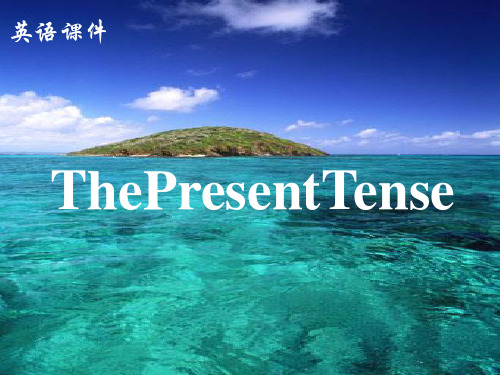
三.表示人曾有过或到目前为止从未有过的经历.
eg:1. Have you ever been to the Summar Palace?
你曾去过颐和园吗?
2. I have never had a car.
我从未有过汽车。
四.现在完成时还常与句型 This is the first time…,It’s the first time …连用。
eg:1.This is the first time he has driven a car .
这是他第一次开车。 五.现在完成时和最高级连用表示到现在为止是最…的。
What a boring film!
一部多么令人厌烦的电影啊!
It’s the most boring film I’ve ever seen.
microscopes.
A.saved
B.have saved
C.has saved D.were saving
6.I was so happy to see John again
last Sunday ,We ______each other
for more than two years.
A.haven’t seen B.hadn’t seen
我已经完成了家作。
二.表示从过去某一时刻开始并一直延续到现在的动作 或事情,但动作或事情可能仍在继续。
eg:1. I want to see how much the place changed
since
I saw it last.
我想看看从上次见到那地方以来它发生了多大变化。
2. I have learnt English for more than ten years.
英语现在完成时与一般过去时的区别
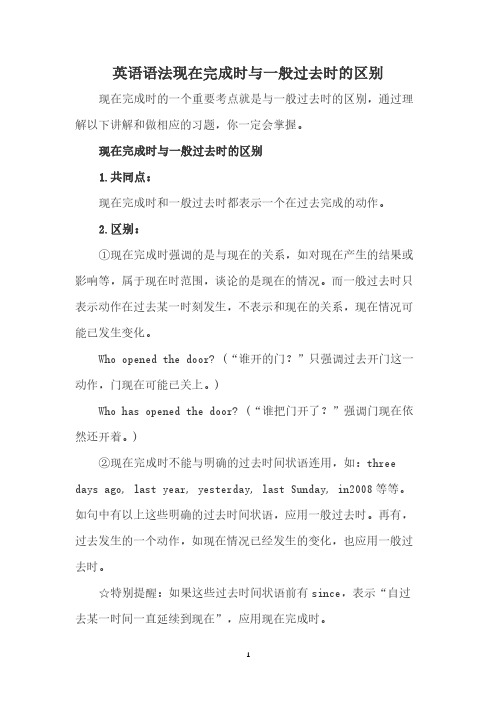
英语语法现在完成时与一般过去时的区别现在完成时的一个重要考点就是与一般过去时的区别,通过理解以下讲解和做相应的习题,你一定会掌握。
现在完成时与一般过去时的区别1.共同点:现在完成时和一般过去时都表示一个在过去完成的动作。
2.区别:①现在完成时强调的是与现在的关系,如对现在产生的结果或影响等,属于现在时范围,谈论的是现在的情况。
而一般过去时只表示动作在过去某一时刻发生,不表示和现在的关系,现在情况可能已发生变化。
Who opened the door? (“谁开的门?”只强调过去开门这一动作,门现在可能已关上。
)Who has opened the door? (“谁把门开了?”强调门现在依然还开着。
)②现在完成时不能与明确的过去时间状语连用,如:three days ago, last year, yesterday, last Sunday, in2008等等。
如句中有以上这些明确的过去时间状语,应用一般过去时。
再有,过去发生的一个动作,如现在情况已经发生的变化,也应用一般过去时。
☆特别提醒:如果这些过去时间状语前有since,表示“自过去某一时间一直延续到现在”,应用现在完成时。
He finished reading the book the day before yesterday.I put my ruler in my pencil-box, but I can’t find it now.My cousin has been in Nanjing since 2009.③现在完成时不与when引导的特殊疑问句连用,when后只用一般过去时表示已发生的动作。
但现在完成时可与where, why等疑问词连用。
如:Where have you been? (你去过哪里了?) --The train has left.--When did the train leave?④since引导的时间状语从句后面用一般过去时,只有前面的主句才用现在完成时。
一般过去时和现在完成时的区别

一般过去时和现在完成时的区别过去时和现在完成时的区别是。
前者表示过去做过的事情,而后者表示过去某个时间正在做的事情通常表示过去的几点。
过去进行时表示过去的某个时间点。
将过去式与现在完成时1)进行比较,过去式表示发生在过去的动作或简单叙述过去的事件,强调动作;现在完成时指的是过去发生的事情。
它强调过去对现在的影响,强调影响。
2)过去常与特定的时间状语连用,但现在通常与模糊的时间状语连用或不与时间状语连用。
过去,有一个普遍的时间状语:昨天,上周,...1980年,10月,刚才,一个特定的时间状语,一个常见的时间状语:今天早上,今晚,今年4月,现在,曾经,以前,已经,最近,最近,从,至今,永远,永远,永远,公正,直到/直到,直到现在,在过去的几年里,时间状语3)可以表示完成时继续到现在的动作或状态。
动词一般是连续的,如生活、教学、学习、工作、学习、知道。
过去常用的非连续动词有来、去、离开、开始、死亡、结束、成为、被破坏等。
例如,我昨天看了这部电影。
这部电影已经公开了。
(强调它对现在的影响。
你为什么起得这么早?(强调起床已经发生了谁还没交论文?(强调试卷,可能是不正当竞争她从巴黎回来了。
她昨天回来了。
他已经在联盟里呆了三年了(在联盟里的地位是可持续的)他已经是联盟成员三年了(联盟成员的地位是可持续的)他三年前加入联盟,加入联盟的时间很短。
)我现在已经完成作业了。
-有人去找怀特医生吗?-如果在句子中有过去时态的时间副词(例如,昨天,上周,1960年),他就可以被叫去了。
你不能用现在完成时,你应该用过去时。
汤姆昨晚给他父母写了一封信。
(1991)概念:表示过去的-|-|->它的结构是had+过去分词结构过去是现在是2)用法a .宾语从句在动词之后,如告诉、说、知道、听到、想等在过去不同时间发生的两个动作中,第一个发生了,最后一个完成了。
之后,使用简单的过去式当政策出台时,第三个已经跑掉了。
表达意图的动词,如希望、愿望、期望、思考、意图、意思和假设等。
一般过去时和现在完成时的区别

一般过去时与现在完成时一般过去时(past simple + finished time)We arrived last week/six months ago/at 3 o’clock.1一般过去时表示过去发生的事情I woke up early and got out of bed yesterday.2如果谈及过去的一般特征或状态、过去经常性或习惯性的动作时,用一般过去时We often saw his dog sitting outside his house.现在完成时(present perfect)现在完成时用以表示过去发生但与现在相关的事情1现在完成时用以表示过去某个不确定时间发生,且对现在有影响的事情I’m afraid I’ve forgotten my book.Kitty has just passed her exams.2现在完成时也可以用以表示从过去开始,到现在仍在继续的事情He has worked here since 1987. (And he still works here.)My parents have lived here for ten years. (And my parents still live here.)现在完成时与一般过去时的比较Compare:I have lost my key. (=I can’t find it now.) I lost my key last week.Bill has gone home. (=he isn’t here now.) Bill went home ten minutes. Have you seen Ann? (=where is she now?) Did you see Ann on Saturday?Time until now finished timePast Now Past Now(一般过去时的句子中一般都会出现表示过去的时间标志)1.Have you ever been to America? (=in your life, until now)Did you go to America last year?2.My friend is a writer. He has written many books.Shakespeare was a writer. He wrote many plays.3.We have lived in Changchun for six years. (we live here now)We lived in Changchun for six years but now we lived in Beijing.一、改错:1. I’ve lost my key. I can’t find it. --------------------------------------------------2. Have you seen Ann yesterday? --------------------------------------------------3. I’ve finished my work at o’clock. --------------------------------------------------4. I am ready now. I’ve finished my work. -------------------------------------------5. What time have you finished your work? ----------------------------------------6. She isn’t here. She has gone out. --------------------------------------------7. Jim’s grandmother has died in 1989. --------------------------------------------8. Where have you been last night? --------------------------------------------二、填入所给词的正确形式:(teach, taught, taught) (go, went, gone) (come, came ,come) (speak, spoke, spoken)1.My friend is a teacher. She…………………. (teach) many books.2.We…………………(not/have) a holiday last year.3.I ……………………..(play) tennis yesterday afternoon.4.What time …………………(you/go) to bed last night?5.………………………………(you/ever/meet) a famous person?6.Kathy travels a lot. She …………………………(visit) many countries.7.My hair is wet. I ……………………….(just/wash) it.8.‘I s Tim here?’‘No, she ……………………(not/come) yet.’三、用一般过去时或现在完成时补全对话:1. A: ………………………….(you/ever/be) to Beijing?B: Yes, we ……….(go) there two years ago.A: …………………………….(you/have) a good time?B: Yes, it ………(be) great.2. A: Where is Ann? ………………………(you/see) her?B: Yes, he …………..(go) out a few minutes ago.A: And Julia?B: I don’t know. I …………….(not/see) here.3. Rose works in a factory. She …………………(work) there for six months.Before that she …….(be) a waitress(女服务员) in a restaurant(餐馆).She ………(work) in that restaurant for two years but she …………….(not/enjoy)it very much.4. A:Do you know Martin’s sister?B:I………………….(see)her a few times but I ……………………. (never/speak) to her …………………(you/ever/speak) to her?A:Yes. I ………………(meet) her at a party last week. She’s very nice.。
- 1、下载文档前请自行甄别文档内容的完整性,平台不提供额外的编辑、内容补充、找答案等附加服务。
- 2、"仅部分预览"的文档,不可在线预览部分如存在完整性等问题,可反馈申请退款(可完整预览的文档不适用该条件!)。
- 3、如文档侵犯您的权益,请联系客服反馈,我们会尽快为您处理(人工客服工作时间:9:00-18:30)。
现在完成时和一般过去时的区别现在完成时和一般过去时都表示一个在过去完成的动作,但现在完成时强调的是与现在的关系,如对现在产生的结果或影响等,属于现在时范围,谈论的是现在的情况。
而一般过去时只表示动作在过去某一时刻发生,不表示和现在的关系,现在情况可能已发生变化。
Who opened the door? (“谁开的门?”只强调过去开门这一动作,门现在可能已关上。
)Who has opened the door? (“谁把门开了?”强调门现在依然还开着。
)◇现在完成时不能与明确的过去时间状语连用,如:three days ago, last year, yesterday, last Sunday, in 2008等等。
如句中有以上这些明确的过去时间状语,应用一般过去时。
再有,过去发生的一个动作,如现在情况已经发生的变化,也应用一般过去时。
☆特别提醒:如果这些过去时间状语前有since,表示“自过去某一时间一直延续到现在”,应用现在完成时。
He finished reading the book the day before yesterday.I put my ruler in my pencil-box, but I can’t find it now.My cousin has been in Nanjing since 2009.◇现在完成时不与when引导的特殊疑问句连用,when后只用一般过去时表示已发生的动作。
但现在完成时可与where, why等疑问词连用。
如:Where have you been? (你去过哪里了?) ----The train has left.----When did the train leave?◇since引导的时间状语从句后面用一般过去时,只有前面的主句才用现在完成时。
We have known each other since we came to the school two years ago.◇有些时间状语,如this morning, this month, tonight等,既可以与一般过去时连用,又可以与现在完成时连用,但内涵不同。
与一般过去时连用时,表示与“现在”无关,时间已成为过去。
而与现在完成时连用,则表示包括“现在”在内。
I saw him this morning. (时间已不在上午了。
)I have seen him this morning. (说话时间还是上午。
)He lived in New York for eight years. (他现在已经不在纽约住了。
)He has lived in New York for eight years. (他现在还在纽约居住。
)◇同步练习动词填空:1. I ___________(see) Tom last Friday.2. ________you ________(go) to the Great Wall last summer?3. ----Where ______ you ______(put) my pen?----I _______(put) it in my pencil-box, but it’s nowhere to be found.4. When ______ you _______(start) to live in China?5. ----The train ____________ (leave) already.----When ________ the train _________(leave)?6. It is five years since I ________(meet) you last.7. Where _______ you ______(be) for the last two weeks?8. I _________ (lose) my pen in the bedroom. I have to write with a pencil.单项选择:( ) 1. ----Where _______ the recorder? I can’t see it anywhere.---- I _______ it right here. But now it’s gone!A. did you put; have putB. have you put; putC. had you put; was puttingD. were you putting; have put( ) 2. My father ________ here since he _______ to this school.A. taught; cameB. has taught; cameC. taught; has comeD. has taught; has come( ) 3. I am sorry you’ve missed the train. It _______ 10 minutes ago. (山东)A. leftB. has leftC. has been leftD. had left( ) 4. Hi! Jim! Nice to meet you again! It’s one year since I last ________ you.(重庆)A. sawB. seeC. seeingD. have seen( ) 5. ---- Have you visited the Dinosaur World, Elsa? (宁波)---- Yes, I _____ it yesterday.A. have visitedB. had visitedC. visitedD. visit( ) 6. ---- Nice to see you. I _______ you for a long time. (南京)---- I ______ in Bejing. I’ve just come back.A. hadn’t seen; amB. haven’t seen; wasC. didn’t see; will beD. haven’t seen; shall be( ) 7. ----What is the weather like this summer here?---- There ______ very little rain.A. hasB. has beenC. areD. have been( ) 8. When _____you _______ your dictionary?A. did; loseB. has; lostC. will; loseD. does; lose( ) 9. Where ______ you _______? Which answer is not right?A. are; goingB. have; beenC. did; goD. are; doing( ) 10. There ______ many great changes in my hometown since ten years ago.A. wereB. haveC. areD. have beenKeys:动词填空:1. saw2. Did, go3. have, put, put4. did, start5. has left, did, leave6. met7. have, been8. have lost单项选择:1~5 BBAAC 6~10 BBADD现在完成时练习题一、单项选择1. Li Hong has ________ the army for 2 years.A. joinedB. be inC. been inD. joined in2. We have been friends since ______.A. childrenB. five yearsC. five years agoD. five years before3. Mike ___________ the story for a month.A. has boughtB. has hadC. had hadD. has borrowed4. You ______ that question three times.A. already askedB. have already askedC. already have askedD. asked already5. Those foreign friends left Guangzhou __________.A. since last weekB. a week agoC. for a weekD. since a week ago6. I _____ at this school for two years.A. am studyingB. studyC. studiedD. have studied7. They _________ in the city since last summer.A. liveB. didn’t liveC. have livedD. live8. Mrs. Wang has lived in Haikou _________ 1992.A. sinceB. fromC. afterD. in9. Mr. Black _________ China since the summer of 1998.A. has been toB. has been inC. has come toD. came to10. His father _______ for years.A. has diedB. has been deadC. diedD. dies11. Mary ________ to see the films because she __________ it twice.A. won’t go, sawB. won’t go, will seeC. won’t go, has seenD. didn’t go, sees12.---- Would you like some more food?----Thank you. I _______ enough.A. will haveB. have hadC. haveD. had13. ______ you ______ England? Yes, it _____ a beautiful country.A. Will, gone to, wasB.Have, been to, isC. Had, been to, isD.Have, gone to, is14. ----_______ you _______ to Beijing?----No, I ______.I ______ there early next month.A. Have, been, haven’t, am goingB. Had, been, hadn’t, am goingC. Have, gone, haven’t, was goingD. Did,go, didn’t, was going15. ---You sister ______ to London to study English. Is that true?---Yes , she ___ there for two months.A. has been, has beenB. will go, has goneC. gone, will beD. has gone, has been16. He has a computer of his own. He ____ it two days agoA. boughtB. boughtC. boughtD. has bought17. —Where is Li Lei? —He ___ Shanghai.A. has gone toB. has been toC. went toD. goes to18. He _______ his homework and is now listening to music.A.. finishesB. has finishedC. finishD. is finishing19. David _______ Shanghai for more than three months.A. came toB. has been toC. has been inD. has come to20. --- Is your father a Party member?--- Yes, he ____ the party three years ago. He _____ a Party member for three years.A. joined; has beenB. has joined; has beenC. was joined; isD. joined; was21. ---What a nice bike! How lone ____ you ____ it? ----Just five weeks.A. will; buyB. did; buyC. are; havingD. have; had22. I ______ this book for a week .I have to return it now.A. borrowedB. have borrowedC. keptD. have kept23. ----______ your sister _______ in Green China for a long time?----Yes. She joined it five years ago.A. Has; beenB. Have; beenC. Has; joinedD. Have; joined24. ---How long have you _______ from the USA? ----For three months.A. come backB. returnedC. go backD. been back25. I _____ this book for half a year.A. have boughtB. have hadC. boughtD. had26. The students are sorry to hear that famous singer _______ for a year.A. has leftB. has goneC. has been awayD. has gone away27. --- ______ you______ your homework yet? ---Yes, I _____ it just now.A. Did; do; finishedB. Have; done; finishedC. Have; done; have finishedD. Will; do; finish28. The sand storm weather ______ in Beijing several times this year.A. happenB. happenedC. has happenedD. have happened29. ---How long have you been here? --- ____ last month.A. ForB. UntilC. BeforeD. Since30. He ____ a cold for three days.A. has caughtB. has hadC. has gotD. caught31. Jim Green ____ in China for two years.A. has comeB. has beenC. has arrivedD. came32. The film ____ for half an hour.A. has been onB. has begunC. hasn’t begunD. began33.—Where have you _______ these days?—I have to Beijing with my friends.A. been;goneB. been;beenC. gone;beenD. gone;gone34.How long have you _______ this book?A. bought B.borrowed C.had D.lent35. We have lived here _______ five years ago.A. when B.since C.before D.after36.—I have watched the game.—When _____you _______ it?A.have;watched B.do;watch C.did;watch D.will;watch 37.—How do you like Beijing, Mr. Black?—Oh,I _______ such a beautiful city.A.don't visit B.didn't visit C.haven't visited D.hadn't visited 38.Miss Brown _______ to the Great Wall twice.A.have been B.has been C.have gone D.has gone39.His brother has been to Stone Forest twice ______ he came to Yunnan.A.after B.before C.since D.for40.His grandpa _______ for two years.A.was died B.has been dead C.was dead D.has died41.—Have you ever_______ to Haikou?—Yes,I_______ there with my family last August.A.gone;went B.been;went C.been;went to D.been;was in42. His sister ______ her hometown for three years. She'll return next year.A.left B.has left C.has been away D.has been away from以适当形式填空1. I_______ already _______ (see) the film. I _________ (see) it last week.2. ----- _______ he ________(finish) his work today ? ------Not yet .3. -----_____you _______(be) to Hong Kong ?----Yes, I ________________ (be) there twice .4. -----_______ you ever ________(eat ) chocolate sundaes ? ----No, never.5. My father ____ just ________ (come) back from work. He is tired now.6. Where’s Li Ming ? He ____________ (go) to the teacher’s office.7. Shanghai _______ (be) a small town hundreds of years ago. Now it ____ (become) a large city.8. I _____________ (work) here since I __________ (move) here in 1999.9. So far I ______________(make) quite a few friends here.10. ---How long ______ the Smiths ________(stay)here? ---- For two weeks.11. --- I ___________ (see) the film “Chicken Run”.--- Where and when ________ you _______ (see) it?--- Last week.12. Mary _____ already _______ (have) her supper.13. I ____________ (not want) to see the film. I ___________ (see) it with my parents. We _________ (see) it last Sunday.14. ---______ Uncle Wang ______ (mend) the TV yet?---Yes, he______.---When _____ he _____ it?--- Yesterday.15. ______ you _______ (read) today’s newspaper yet?16. They _____already_____(do) their homework. But they don’tknow what_____ (do) next.17. ---____ you _____ (see) the film last night?---No, I ___________ (see) it for several times.18. She ____________ (be) ill for three days.19. My father ___________ ( buy) a book for me yesterday. He____ already _________(pay) fifty yuan for it.20. She____________ (not read) this book before.21. ____ you ever __________ (travel) on a train before?22. --- ____ Wei Hua _____ (come) yet?---Yes. She_______ (come) already. She ______ (come) just now.23. ---How long _____you __________(learn) English?---For more than two years.24. They _______________ (live) in China since they _____ (move) to China.句型转换(每空一词)。
